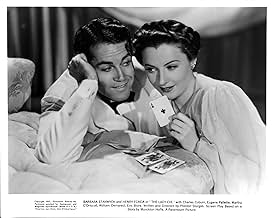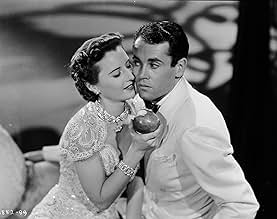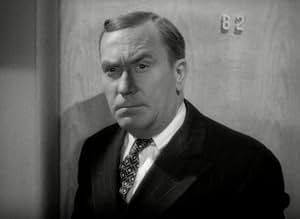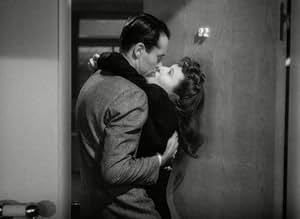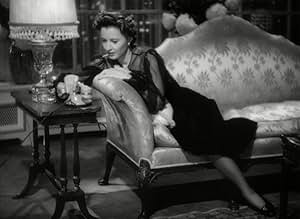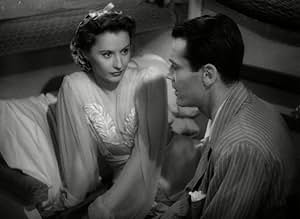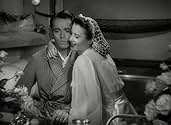VALUTAZIONE IMDb
7,7/10
24.759
LA TUA VALUTAZIONE
Un trio di eleganti giocatori esperti di carte prende di mira l'erede asociale di un impero milionario della birra cercando di impossessarsi dei suoi soldi, finché una di loro si innamora di... Leggi tuttoUn trio di eleganti giocatori esperti di carte prende di mira l'erede asociale di un impero milionario della birra cercando di impossessarsi dei suoi soldi, finché una di loro si innamora di lui.Un trio di eleganti giocatori esperti di carte prende di mira l'erede asociale di un impero milionario della birra cercando di impossessarsi dei suoi soldi, finché una di loro si innamora di lui.
- Regia
- Sceneggiatura
- Star
- Candidato a 1 Oscar
- 5 vittorie e 1 candidatura in totale
Abdullah Abbas
- Man with Potted Palm
- (non citato nei titoli originali)
Norman Ainsley
- Sir Alfred's Servant
- (non citato nei titoli originali)
Mary Akin
- Passenger on Ship
- (non citato nei titoli originali)
Sam Ash
- Husband on Ship
- (non citato nei titoli originali)
Harry A. Bailey
- Lawyer
- (non citato nei titoli originali)
Bobby Barber
- Ship's Waiter with Toupee
- (non citato nei titoli originali)
Recensioni in evidenza
Fast-talking, quick-thinking, altogether delightful comedy from Preston Sturges, who also adapted the screenplay from Monckton Hoffe's original story. An elderly cardsharp and his equally crooked daughter, traveling in style by cruise ship from South America, zero in on their next victim--a handsome but somewhat unsteady ale-heir--but the daughter mixes business with pleasure and ends up falling for the lug. Barbara Stanwyck, with her crafty stare and sexy smirk, surprisingly doesn't run roughshod over articulate Henry Fonda, and they make a winning combination. Sturges' script blends grown-up jokes and conversation with pratfalls while never losing the filmmaker's graceful touch and innate sophistication. The results are amusingly frisky, prickly and unpredictable. *** from ****
The Lady Eve is one of the most memorable comedies of the golden age, and today it stands as a highly entertaining movie that has a lot of enjoyably dated comedy. Particularly hilarious are the scenes in which Stanwyck spills her life story to Fonda as they swoosh under the train tunnel, and the scenes in which the food trays keep spilling on Fonda. The performances are great, and though it seems more like Stanwyck falls for Fonda out of pity more than love, the two work well together. And Barbara Stanwyck in that black, bare-midriff dress is one of the most breath-takingly beautiful images ever to appear on the screen.
On the surface of it, THE LADY EVE is a delightfully shallow evening's entertainment. It's a clever little film, filled with great dialogue ("Don't be vulgar, Jean. Let us be crooked, but never common.") and eccentric characters, from the leading lady Jean (a marvellous Barbara Stanwyck) and her much-beleaguered main man Charlie Pike (Henry Fonda) down to the other con artists that make up Jean's circle, including her dad Harry (Charles Coburn), sidekick Gerald (Melville Cooper) and Sir Alfred McGlennan Keith (Eric Blore)... or just Pearlie for short. Charlie is heir to the Pike Ale fortune, and while on a cruise home from South America, Harrington father and daughter decide to take the hapless lad to the metaphorical drycleaners. What neither of them gambles on is a romance that was always in the cards for Jean and Charlie. But just as Jean is about to go 'straight' for Charlie, he discovers that his girlfriend is part of a con racket, and unceremoniously dumps her. Hurt and determined to get revenge for his cruel parting words, Jean initiates a farce as the Lady Eve Sidwich of the film's title and infiltrates Charlie's home and heart again. She quickly teaches him a lesson he'll never forget, just as she realises how much she really still loves Charlie.
Story-wise, then, it's no doubt that THE LADY EVE provides fine frothy entertainment. Pair that with the surreal touches added into the film by Preston Sturges (take for example the supposedly climactic scene in which Charlie repeats his words of love to Eve--Fonda never gets to play the scene straight, even though he has to maintain a stony face as his horse keeps butting into his speech... presumably to try to get him to stop talking!), and there's certainly plenty to keep one occupied as is. The film is, of course, a screwball comedy absolutely bent on throwing every possible obstacle it can into the path of its intended couple, coming up with more twists than you expect...
However, thanks largely to the brilliant writing and direction provided by Sturges, it actually also plays very close and very insightfully to the theme of what Stanley Cavell calls 'remarriage comedy'. The idea behind this is that legal or religious marriages, the 'first' marriages of the couple concerned in such comedies, are actually sham marriages. It isn't saying 'I do' or signing a piece of paper that makes a marriage a marriage; it's the behaviour of the couple, their own endorsement, that makes it a true marriage. This theme is reflected in, for example, THE AWFUL TRUTH, which sees Lucy and Jerry Warriner divorcing (their first, sham marriage didn't work out) but getting back together again for a true, albeit not yet legalised, union. The same theme pervades THE PHILADELPHIA STORY. Preston Sturges very skilfully and effectively--but subtly!--brings this theme to his film as well. Eve and Charlie are married, but it is only when Charlie asks Jean for forgiveness and vice versa is it possible for the fact that they are married (to each other, as poor Charlie does not know!) to become significant and actually positively affirmed.
This isn't the only interesting point the film makes while appearing to be little more than a fluffy piece of entertainment--when Charlie breaks Jean's heart, she tells him, "The best [girls] aren't as good as you think they are and the bad ones aren't as bad. Not nearly as bad." She sets out to prove this, both in her fabricated 'good-girl' persona as Eve (later revealed to have had many MANY suitors) and her real 'bad-girl' con-artist self Jean (who has a soft heart and a love for Charlie that proves to be one of her virtues). Practically everyone in the film has (at least) two names by which they're known: Jean/Eve, Charlie/Hopsie, Muggsy/Murgatroyd/Ambrose, Harry/Colonel Harrington, Pearlie/Sir Alfred and so on. This suggests, quite rightly, that people are complicated complex beings, and that appearances often have nothing to do with reality. It also brings the film's story to a head--Jean and Charlie can never be happy together until Charlie can accept Jean as she is, and this he presumably will have learnt through his short, disastrous 'marriage' to Eve.
Stanwyck and Fonda are really outstanding in this film. Stanwyck's job is to persuasively depict two characters, and then effect a blend of the two of them in the final minutes of the story, and she pulls off both the sassy, confident Jean and the elegant, British Eve perfectly. It's not hard to imagine Charlie falling hard for Jean, even with her hard-headed casing of the joint and her prospective competition (appropriately deemed second-rate) for his affections... a very memorable scene involving her make-up mirror and a narrative voice-over, the latter of which is used to great effect in the lead-up to the 'romantic scene and horse' bit which follows later in the film. Fonda has the apparently easier job of appearing mostly colourless and stodgy as he spends most of his screen time reacting to situations created by both Jean and Eve, but I contend that it must really take quite a lot of true acting ability to execute the pratfalls that he does without making Charlie such a wimp that you can't imagine Jean still wanting him at the very end. Though not quite as effective as Cary Grant, who has to do the same thing in the face of Katharine Hepburn's breathlessly effusive Susan Vance in BRINGING UP BABY, Fonda still brings a sweet charm to his role as the not-at-all-slick, often befuddled Charlie Pike. Add these two classy performances to that given by the able supporting cast, and THE LADY EVE is not just well-scripted and directed, but also very very well-acted indeed.
So, watch this film the first time just for fun--be charmed by the characters, by the dialogue, by the actors, by everything. Then watch it again to realise just how subtly and effectively THE LADY EVE actually makes several comments on marriage and on love. I highly recommend getting your hands on the Criterion Collection DVD, which has (aside from a tremendous photo gallery and interview with Peter Bogdanavich and other special features) a fantastic, thought-provoking commentary by film critic Marian Keane--it most certainly got *me* thinking!
Great film, great entertainment, great message!
Story-wise, then, it's no doubt that THE LADY EVE provides fine frothy entertainment. Pair that with the surreal touches added into the film by Preston Sturges (take for example the supposedly climactic scene in which Charlie repeats his words of love to Eve--Fonda never gets to play the scene straight, even though he has to maintain a stony face as his horse keeps butting into his speech... presumably to try to get him to stop talking!), and there's certainly plenty to keep one occupied as is. The film is, of course, a screwball comedy absolutely bent on throwing every possible obstacle it can into the path of its intended couple, coming up with more twists than you expect...
However, thanks largely to the brilliant writing and direction provided by Sturges, it actually also plays very close and very insightfully to the theme of what Stanley Cavell calls 'remarriage comedy'. The idea behind this is that legal or religious marriages, the 'first' marriages of the couple concerned in such comedies, are actually sham marriages. It isn't saying 'I do' or signing a piece of paper that makes a marriage a marriage; it's the behaviour of the couple, their own endorsement, that makes it a true marriage. This theme is reflected in, for example, THE AWFUL TRUTH, which sees Lucy and Jerry Warriner divorcing (their first, sham marriage didn't work out) but getting back together again for a true, albeit not yet legalised, union. The same theme pervades THE PHILADELPHIA STORY. Preston Sturges very skilfully and effectively--but subtly!--brings this theme to his film as well. Eve and Charlie are married, but it is only when Charlie asks Jean for forgiveness and vice versa is it possible for the fact that they are married (to each other, as poor Charlie does not know!) to become significant and actually positively affirmed.
This isn't the only interesting point the film makes while appearing to be little more than a fluffy piece of entertainment--when Charlie breaks Jean's heart, she tells him, "The best [girls] aren't as good as you think they are and the bad ones aren't as bad. Not nearly as bad." She sets out to prove this, both in her fabricated 'good-girl' persona as Eve (later revealed to have had many MANY suitors) and her real 'bad-girl' con-artist self Jean (who has a soft heart and a love for Charlie that proves to be one of her virtues). Practically everyone in the film has (at least) two names by which they're known: Jean/Eve, Charlie/Hopsie, Muggsy/Murgatroyd/Ambrose, Harry/Colonel Harrington, Pearlie/Sir Alfred and so on. This suggests, quite rightly, that people are complicated complex beings, and that appearances often have nothing to do with reality. It also brings the film's story to a head--Jean and Charlie can never be happy together until Charlie can accept Jean as she is, and this he presumably will have learnt through his short, disastrous 'marriage' to Eve.
Stanwyck and Fonda are really outstanding in this film. Stanwyck's job is to persuasively depict two characters, and then effect a blend of the two of them in the final minutes of the story, and she pulls off both the sassy, confident Jean and the elegant, British Eve perfectly. It's not hard to imagine Charlie falling hard for Jean, even with her hard-headed casing of the joint and her prospective competition (appropriately deemed second-rate) for his affections... a very memorable scene involving her make-up mirror and a narrative voice-over, the latter of which is used to great effect in the lead-up to the 'romantic scene and horse' bit which follows later in the film. Fonda has the apparently easier job of appearing mostly colourless and stodgy as he spends most of his screen time reacting to situations created by both Jean and Eve, but I contend that it must really take quite a lot of true acting ability to execute the pratfalls that he does without making Charlie such a wimp that you can't imagine Jean still wanting him at the very end. Though not quite as effective as Cary Grant, who has to do the same thing in the face of Katharine Hepburn's breathlessly effusive Susan Vance in BRINGING UP BABY, Fonda still brings a sweet charm to his role as the not-at-all-slick, often befuddled Charlie Pike. Add these two classy performances to that given by the able supporting cast, and THE LADY EVE is not just well-scripted and directed, but also very very well-acted indeed.
So, watch this film the first time just for fun--be charmed by the characters, by the dialogue, by the actors, by everything. Then watch it again to realise just how subtly and effectively THE LADY EVE actually makes several comments on marriage and on love. I highly recommend getting your hands on the Criterion Collection DVD, which has (aside from a tremendous photo gallery and interview with Peter Bogdanavich and other special features) a fantastic, thought-provoking commentary by film critic Marian Keane--it most certainly got *me* thinking!
Great film, great entertainment, great message!
I don't know how I missed seeing this until now, but tonight I watched THE LADY EVE unfurl on TCM and took notice of how great the chemistry was between BARBARA STANWYCK and HENRY FONDA. And even more so, how fantastic their ability with screwball comedy had to be in order to make their characters as believable as they are.
Fonda, especially, impressed me with his honestly naive interpretation of a man without guile. He seemed totally hoodwinked by Stanwyck's con artist, even in those relentless close-ups that captured every expression on his Honest Abe face. Stanwyck, of course, had a role tailored to her abilities and was at the top of her form as an actress.
I would have liked a better role for Melville Cooper who is somewhat wasted in his rather thankless supporting role but Charles Coburn, William Demarest and Eric Blore have no such trouble with full-bodied character parts.
Sturgess obviously is a master of long takes--and proves it again in his seduction scene where Stanwyck toys with Fonda's hair as she drapes herself across him, a spider spinning her web. Her best moment is the scene in the dining room where she uses her make-up mirror to make a running commentary on all the women who are ogling the rich catch (Fonda) while he becomes aware of the female attention. Although Fonda's pratfalls are painfully real, Sturges lets them occur a little too frequently. Demarest too has his share of falls--as he did in that other Sturges masterpiece, THE MIRACLE OF MORGAN'S CREEK.
Fonda's performance ranks with his mild professor in THE MALE ANIMAL. As for Stanwyck, her professionalism has never been more solid. She was nominated in 1941 for Best Actress in BALL OF FIRE but she is equally impressive in her dual role assignment here.
Fonda, especially, impressed me with his honestly naive interpretation of a man without guile. He seemed totally hoodwinked by Stanwyck's con artist, even in those relentless close-ups that captured every expression on his Honest Abe face. Stanwyck, of course, had a role tailored to her abilities and was at the top of her form as an actress.
I would have liked a better role for Melville Cooper who is somewhat wasted in his rather thankless supporting role but Charles Coburn, William Demarest and Eric Blore have no such trouble with full-bodied character parts.
Sturgess obviously is a master of long takes--and proves it again in his seduction scene where Stanwyck toys with Fonda's hair as she drapes herself across him, a spider spinning her web. Her best moment is the scene in the dining room where she uses her make-up mirror to make a running commentary on all the women who are ogling the rich catch (Fonda) while he becomes aware of the female attention. Although Fonda's pratfalls are painfully real, Sturges lets them occur a little too frequently. Demarest too has his share of falls--as he did in that other Sturges masterpiece, THE MIRACLE OF MORGAN'S CREEK.
Fonda's performance ranks with his mild professor in THE MALE ANIMAL. As for Stanwyck, her professionalism has never been more solid. She was nominated in 1941 for Best Actress in BALL OF FIRE but she is equally impressive in her dual role assignment here.
Henry Fonda and Barbara Stanwyck light up the delightful Preston Sturges comedy, "The Lady Eve." Stanwyck plays a dual role as a con artist who falls for a mark, Henry Fonda, on board a ship and then, angry with his rejection of her, reappears in his life later as a member of the British upper class - you got it, the Lady Eve.
Fonda is hilarious as a clueless child of privilege. Always the most subtle, internalized of actors, his facial expressions are priceless, as is his slapstick.
The funniest scene takes place on a train when, as the train races along the tracks, Eve recounts her various love affairs while Fonda becomes more and more flummoxed.
Betty Grable got a lot of publicity for her legs, but Stanwyck's were the best, shown to great advantage here, as is the rest of her gorgeous figure. She's fantastic in this and has great chemistry with Fonda.
Stanwyck always creates a whole character, and she does here as well (in fact, two of them) as a woman who is smart, independent, vulnerable in love, and conniving when angry.
A great comedy, not to be missed.
Fonda is hilarious as a clueless child of privilege. Always the most subtle, internalized of actors, his facial expressions are priceless, as is his slapstick.
The funniest scene takes place on a train when, as the train races along the tracks, Eve recounts her various love affairs while Fonda becomes more and more flummoxed.
Betty Grable got a lot of publicity for her legs, but Stanwyck's were the best, shown to great advantage here, as is the rest of her gorgeous figure. She's fantastic in this and has great chemistry with Fonda.
Stanwyck always creates a whole character, and she does here as well (in fact, two of them) as a woman who is smart, independent, vulnerable in love, and conniving when angry.
A great comedy, not to be missed.
Lo sapevi?
- QuizIt was hibernation season during the shoot, and Emma the king snake was always sleeping while also shedding her skin. Needless to say, she was very uncooperative.
- BlooperWhen Jean is looking at Charles in the mirror, what she sees is the right way round instead of reversed. (This can be seen by looking at the cover of Charles' book.)
- Curiosità sui creditiA very large cartoon snake displays the opening credits while twining around an apple tree.
- ConnessioniEdited into Spisok korabley (2008)
I più visti
Accedi per valutare e creare un elenco di titoli salvati per ottenere consigli personalizzati
Dettagli
- Data di uscita
- Paese di origine
- Lingua
- Celebre anche come
- Las tres noches de Eva
- Luoghi delle riprese
- Azienda produttrice
- Vedi altri crediti dell’azienda su IMDbPro
Botteghino
- Lordo in tutto il mondo
- 15.142 USD
- Tempo di esecuzione1 ora 34 minuti
- Colore
- Proporzioni
- 1.37 : 1
Contribuisci a questa pagina
Suggerisci una modifica o aggiungi i contenuti mancanti


